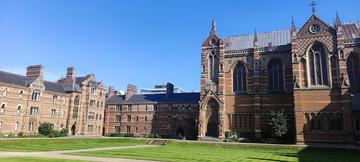Phil Jones is Head of Digital Innovation at the Cornwall Museums Partnership and was awarded a bursary to attend the Digital Humanities Oxford Summer School in 2023, on the When Archives Become Digital strand. To find out more about this year's bursaries see here. To join the mailing list and learn about the next summer school sign up here.
I had the privilege of attending the University of Oxford's Digital Humanities Summer School for 5 days in July. The event consisted of several dedicated strands, and I took part in the "When Archives Become Digital" sessions led by the brilliant Andrew Cusworth. It was an incredibly rewarding experience being able to immersive myself in learning away from the day-to-day demands of my role at Cornwall Museums Partnership. There was a perfect balance of hands-on sessions, workshops and speaker presentations, all from leading experts in their field. They provided wonderful insights into the best practice of leading digitisation in heritage and maintaining digital archives, challenging me to look at aspects that I had not before considered.
I work with small, often volunteer run museums across Cornwall and regularly find when I visit national and international conferences or events that the focus is on larger organisations. It was brilliant therefore to have the opening day's keynote focusing on the challenges of community created digital content- immediately getting me into the swing of things and reassuring me that I belonged here. Other lectures were equally relevant and as a museum's specialist I obviously enjoyed the University's Museums team's presentation. Indeed, I spent most of my lunchtimes rushing across the city to immerse myself in the Ashmolean, Pitt Rivers, History of Science and Natural History Museums eking out every last opportunity from the week.
One particular highlight for me was visiting the Bodleian Library's Digitisation Department. We were enthusiastically shown around by the team there despite us interrupting their work! Everyone spoke passionately about the technology they were using, how they had adapted it and what their day-to-day schedules were like. As an unashamed tech geek, getting to see all those cameras and scanners was a real treat and the team graciously showed us examples of the things they were digitising. There was also a chance to see the groundbreaking 3D scanning work that was stunning and inspired me to think how we could use this in Cornwall.
It all seamlessly linked together with the workshop sessions, highlights here included a probing data discovery day and some fabulous insights from the National Archives team.
On top of all this, one unexpected benefit was getting to work with an amazing diverse group of "classmates" that gave me a fantastic window on their worlds and how I could use this in my own work. With diverse backgrounds in heritage, academia and libraries from across the globe, it was great to here about the projects they had been involved in. There's something wonderful about hearing that someone working in a University in the US has some of the same issues as someone with a library in Germany and those are the same issues I've been grappling with in Cornwall.
I've taken away so much, that I'm still processing all the notes, presentations and photos I took from the week (although it feels like I was there for a year). As Head of Digital Innovation here at CMP, I'm really excited to be able to bring this best practice to our partner museums across Cornwall and I look forward to putting it all in place. A massive thank you to the organisers and the team behind the scenes who made everything work like clockwork. Finally, a big thank you to all the engaging speakers, workshop leaders and Andrew Cusworth who led our strand in such a fun and inclusive way.

Keble College (photograph by Phil Jones)